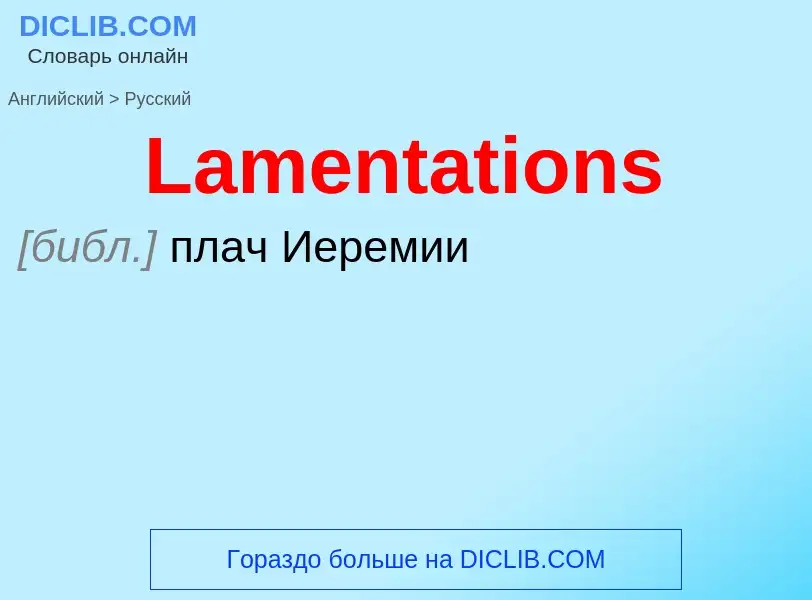Traduzione e analisi delle parole tramite l'intelligenza artificiale ChatGPT
In questa pagina puoi ottenere un'analisi dettagliata di una parola o frase, prodotta utilizzando la migliore tecnologia di intelligenza artificiale fino ad oggi:
- come viene usata la parola
- frequenza di utilizzo
- è usato più spesso nel discorso orale o scritto
- opzioni di traduzione delle parole
- esempi di utilizzo (varie frasi con traduzione)
- etimologia
Lamentations - traduzione in russo
[læmən'teiʃ(ə)n]
существительное
общая лексика
жалобы
сетования
ламентации
горестная жалоба, плач
Wikipedia

The Book of Lamentations (Hebrew: אֵיכָה, ʾĒḵā, from its incipit meaning "how") is a collection of poetic laments for the destruction of Jerusalem in 586 BCE. In the Hebrew Bible it appears in the Ketuvim ("Writings") as one of the Five Megillot (or "Five Scrolls") alongside the Song of Songs, Book of Ruth, Ecclesiastes and the Book of Esther although there is no set order. In the Christian Old Testament it follows the Book of Jeremiah, as the prophet Jeremiah is its traditional author. However, according to modern scholarship, while the destruction of Jerusalem by Babylon in 586/7 BCE forms the background to the poems, they were probably not written by Jeremiah. Most likely, each of the book's chapters was written by a different anonymous poet, and they were then joined to form the book.
Some motifs of a traditional Mesopotamian "city lament" are evident in this book, such as mourning the desertion of the city by God, its destruction, and the ultimate return of the divinity; others "parallel the funeral dirge in which the bereaved bewails... and... addresses the [dead]". The tone is bleak: God does not speak, the degree of suffering is presented as overwhelming, and expectations of future redemption are minimal. Nonetheless, the author repeatedly makes clear that the city (and even the author himself) had profusely sinned against God, to which God had strongly responded. In doing so the author does not blame God but rather presents him as righteous, just and sometimes even as merciful.


![Rembrandt]]) Rembrandt]])](https://commons.wikimedia.org/wiki/Special:FilePath/Rembrandt Harmensz. van Rijn - Jeremia treurend over de verwoesting van Jeruzalem - Google Art Project.jpg?width=200)
![The lamentations of Jeremiah are depicted in this 1860 woodcut by [[Julius Schnorr von Karolsfeld]] The lamentations of Jeremiah are depicted in this 1860 woodcut by [[Julius Schnorr von Karolsfeld]]](https://commons.wikimedia.org/wiki/Special:FilePath/Schnorr von Carolsfeld Bibel in Bildern 1860 141.png?width=200)


